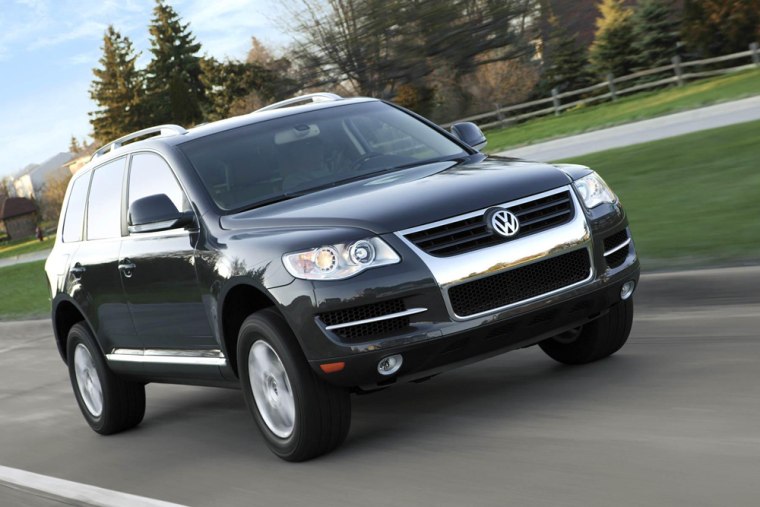With soaring gas prices prompting more Americans to look for alternatives at the pump, the federal government is extending tax credits to the option least favored by drivers: diesel.
The Alternative Motor Vehicle tax credit previously available to hybrid buyers under the Energy Policy Act of 2005 will now be offered on certain diesel vehicles.
A trio of new diesel-powered crossover utility vehicles from Mercedes-Benz — the GL320, ML320 and R320 Bluetec — qualify for the credit, which ranges from $900 for the ML320 to $1,800 for the GL320. All three models are set to go on sale this October.
Volkswagen has announced the availability of a $1,300 income tax credit for buyers of its 2009 Jetta TDI diesel sedan and wagon, both of which are on sale now.
The tax credit amount is based on how much fuel a diesel vehicle will conserve compared to a similar model from 2002, according to a report in Automotive News. As with hybrids, buyers of only the first 60,000 alternative-fuel vehicles from each automaker will qualify for the credit.
The credit is good for vehicles bought before the end of 2010.
The tax credit available on the Jetta TDI is considerably smaller than the $4,000 premium the diesel Jettas command over their gasoline-powered counterparts. Making matters worse is the fact that diesel fuel currently costs more than gasoline.
Volkswagen touts that the 2009 Jetta TDI delivers 29 miles per gallon in the city and 40 mpg on the highway, compared to 21 mpg city and 29 mpg highway for the base non-diesel Jetta model.
Stephanie Brinley, senior manager for product analysis at AutoPacific in Southfield, Mich., said the tax credit is useful, but not enough to counteract diesel fuel costs, which exceed those of gasoline anywhere from 80 cents to $1.04 a gallon in different parts of the country.
The Volkswagen Jetta TDI and Mercedes Bluetec models are currently the only ones that qualify for the tax credit. But a slew of next-generation diesel vehicles that could conceivably qualify will start hitting showrooms this fall. Among them are new versions of the Audi A4 Sedan, Audi Q7 sport utility vehicle, BMW 3 Series Sedan, Cadillac CTS, Ford F-150 and Saturn Aura. (Read more about coming diesels by clicking on the “slide show” link below.)
Though financial incentives have proven to be an effective way for automakers to sell unwanted inventory, studies indicate that tax credits might not be as effective.
A 2008 J.D. Power and Associates study of more than 4,000 consumers who plan to buy a vehicle in the next two years ranked tax credits near the bottom among reasons to purchase an alternative-fuel car.
The annual Web-based Alternative Powertrain Study, conducted from May to June and published July 15, showed consumer interest in diesel vehicles tumbled sharply. Only 16 percent of respondents said they would consider a diesel model for their next purchase, compared to 23 percent in 2007.
By contrast, interest in hybrids spiked, with 62 percent of respondents willing to consider one, up from 50 percent in 2007. Interest in flex-fuel vehicles, which run on E85, a mixture of 85 percent ethanol and 15 percent gasoline, declined slightly from 47 percent in 2007 to 43 percent this year.
The 10- to 20-percent premium on the price of diesel fuel was the major turnoff as financial issues trumped environmental concerns among pollsters most likely to buy alternative-fuel cars, said Mike Marshall, J.D. Power's director of automotive emerging technology. He also cited concerns about diesel vehicles being unclean and the higher price of the vehicle relative to gas-powered equivalents as stumbling blocks mentioned by consumers.
"Hybrids are a great foray into the world of fuel-efficiency for many buyers," said Lonnie Miller, director of Industry Analysis at R.L. Polk and Co. "Unfortunately, we still have an uphill battle for diesel and ethanol adoption given the need for more consumer education and improvements with filling station infrastructure."
Diesel vehicles have an image problem. For starters, Americans don't know much about them.
"What they do know is that it smells bad, and it's yucky," AutoPacific's Brinley said. "When they think of diesel, they think of the smelly bus that shuttled them from the airport to the hotel."
The latest diesel vehicles, however, are a different sort. They have advanced engine and emissions technology and run on low-sulfur diesel fuel to drastically reduce exhaust emissions.
Backers of diesel vehicles argue play up the fact that they're 25 percent to 30 percent more fuel efficient than equivalent gas-powered models. Some go so far as to say that diesels are better than hybrids for highway driving, where the advantages of electric-motor assist are diminished.
Still, hybrid vehicle registrations in the United States reached 350,289 as of Dec. 31, 2007, a 38 percent increase over 2006, according to R.L. Polk. Registrations for diesel models decreased during that same time frame.
R.L. Polk's Miller said the industry must do a better job of getting non-hybrid alternative-fuel cars into the market for people to see and experience. That way automakers can start "planting seeds" with buyers about cleaner fuel technology that doesn't carry the baggage of older diesels.
With the new diesel tax credit and a spate of advanced diesel vehicles coming soon, it appears that manufacturers' efforts to play up diesel technology is already gaining momentum.
